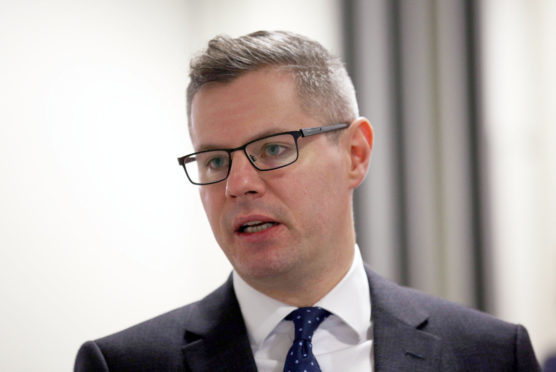Ferguson Marine shipyard is to be nationalised in an attempt to ensure two new west coast ferries are completed.
Finance Secretary Derek Mackay said the step had been taken to protect 300 jobs on the Clyde and to deliver the vessels earmarked for Hebridean and Arran routes.
But Ferguson insiders last night voiced concerns that taking the yard into public control could damage the company’s world leading projects to deliver hydrogen powered ferries for Orkney.
The Scottish Government acted after a long-running dispute over the soaring costs of the west coast ferries destined for the Ardrossan to Arran route and the Uig to Tarbet and Lochmaddy route.
Mr Mackay claimed the move was needed to keep the yard afloat. But his opponents questioned the use of taxpayers’ cash and called for an urgent parliamentary inquiry.
The Finance Secretary said: “The alternative was for the government to stand aside while the company went into administration, resulting in the jobs being lost and the vessels not being completed.”
Last week, Ferguson Marine Engineering Limited (FMEL) said it had no choice but to call in administrators with the yard arguing it stands to lose £40 million from the deal for the two ferries.
In 2014, the yard was saved from collapse by Clyde Blowers tycoon Jim McColl in a deal that was partly brokered by former first minister Alex Salmond.
FMEL has since received £45 million in Scottish Government loans over the last five years.
The yard also secured a £97 million contract to build the two Calmac vessels on behalf of the government agency Caledonian Maritime Assets Ltd (CMAL).
However, in the intervening period, the cost of building the boats has almost doubled.
Donald Cameron, Highlands and Islands Tory MSP, described the situation as a “complete farce”.
Mr Cameron said: “No-one seems to have any idea of the cost of nationalisation or what effect state ownership of the yard will have on its ability to win new business.
“We urgently need a parliamentary inquiry to find out exactly what has gone wrong.”
The government said it would use part of its £45 million of loan to FMEL to fund a credit bid for the yard.
Ministers will now operate the yard under a management agreement with administrators, which will see the Scottish government buy the facility if no private buyer is found within four weeks.
Ferguson’s chief naval architect Chris Dunn expressed concern that nationalising the shipyard could have an impact on multi-million pound projects for Orkney ferries powered by green fuel.
FMEL is involved in a 9.3 million euro project to build the world’s first hydrogen powered ferry, which would eventually operate in Orkney.
The Shapinsay to Kirkwall ferry was recently serviced as part of a related project to convert it to using an environmentally friendly form of hydrogen as a fuel.
Mr Dunn said the government’s goal was to finish the two west coast ferries, which was an ambition he understood.
But he added: “We have a commercial opportunity pipeline in the shipyard and hydrogen projects are part of that.
“I don’t know if there’s an appetite to continue with the innovation side of it.
“There may be, but we don’t know. Resources may be directed elsewhere and that’s a concern.”
